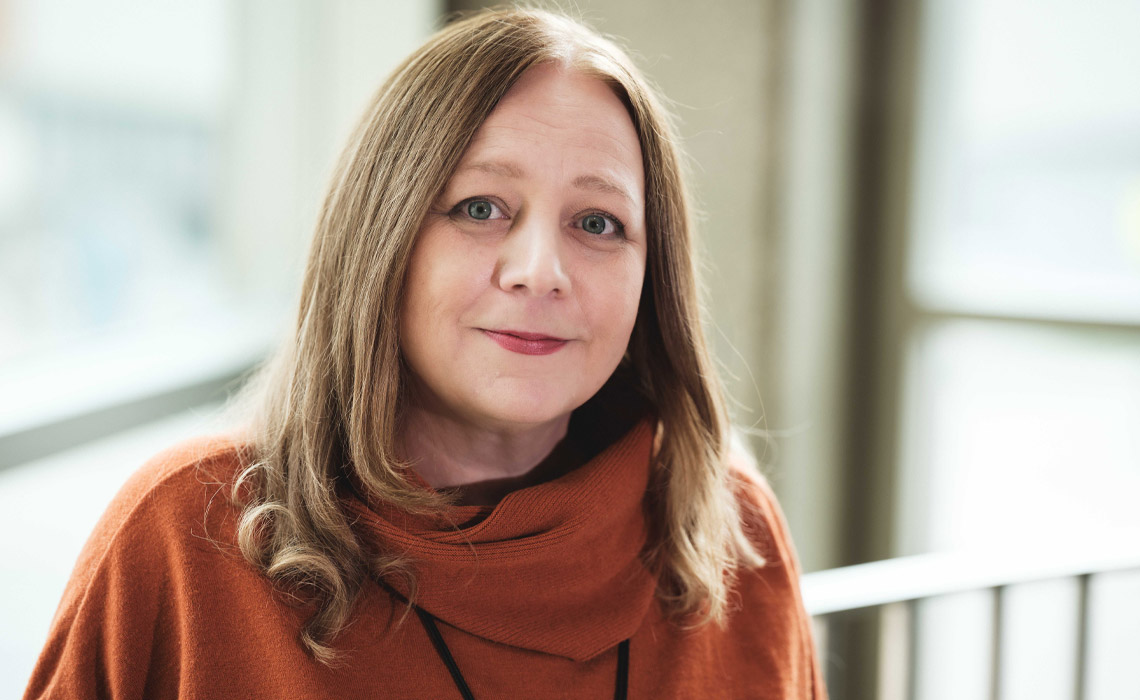Building bridges to the past for the students of today

This profile is part of Celebrate U, Mount Royal's employee rewards and recognition program. The University values and appreciates the exceptional work and contributions of our employees. Through this program, we aim to celebrate those who have dedicated themselves to the success of Mount Royal.
Dr. Jennifer Pettit, PhD, can remember the car (a 1970’s-era avocado green Buick LeSabre sedan), the museums and historic sites (among them, Black Creek Pioneer Village in Ontario and Nova Scotia’s Peggy’s Cove), and she vividly recalls hearing the stories of the original people of the land that some now call Canada. She credits these road trips she experienced as a child for building her passion for history.
“Fostering an appreciation of history was important to my father who, during WWII, was forced to quit school to help support the family farm,” explains Pettit, MRU’s Dean of the Faculty of Arts. “I still am unable to part with my collection of souvenir flags purchased from various locations on trips we took together, now faded but still a symbol to me about how varied Canada’s past is, yet also how interrelated.”
Years later, with a PhD in history in hand, Pettit first stepped onto the Mount Royal Lincoln Park Campus to pursue her teaching career. She quickly learned that MRU offered a space where, she says, “teaching is valued and celebrated, and one is encouraged to follow less traditional research routes.”
Pettit says it’s that freedom to explore that allowed her to develop a variety of projects connected to her research and teaching, and to build her connections to many groups, including students, elementary and secondary Social Studies teachers, the public, and various places and cultures.
And Pettit sees this as part of true community-building. “There is a very strong sense of community at MRU — it is rare when I don’t know a person’s name.”
Now entering her 27th year as an MRU faculty member, Pettit cites that feeling of belonging and the parts each of us plays in remembering, understanding and building the communities around us that drives her work today.
Beyond MRU, Pettit has lent her expertise to institutions such as the Calgary Public Library, Heritage Park Historical Village and the Fort Whoop-Up Historical Society, highlighting the strong links the Faculty of Arts continues to develop with the wider community.
Pettit’s research has centred primarily on Indigenous Peoples and Canadian history, with a particular focus on industrial schools, the forerunner to the residential school system in Canada.
And it’s in this latter focus where she finds the need for critical community connection. Pettit is committed to education-based reconciliation, and she has taken on many different projects and committees that help advance Indigenization and decolonization at MRU.
As an advocate for experiential, place-based, and service learning, Dr. Pettit has developed field activities for many courses, including a cross-Canada travel study course by bus, a trip with a colleague to the battlefields of Europe, and a Treaty 7 field course in southern Alberta, built in collaboration with local Elders.
“I encourage my students to connect to history by taking them beyond the classroom whenever possible and devising new and exciting ways to learn about history,” she explains.
Ultimately, she sees herself as a bridge builder, both through bringing the past to life and connecting the past to today.

